Chinese University of Hong Kong
The first of these, New Asia College, was established in 1949 by anti-Communist Confucian scholars from mainland China amid the Chinese Communist Revolution there.Academics there were often self-exiled from the mainland and struggled financially, with students sometimes sleeping on rooftops and teachers foregoing pay to sustain the college.Funds were gradually raised and the school moved to a new campus in Kau Pui Lung, built with the support of the Ford Foundation, in 1956.[8] By 1962, a year before the founding of CUHK, Chung Chi had 531 students in 10 departments taught by a full-time faculty of 40 (excluding tutors).[11] In June 1959, the Hong Kong government expressed its intent in establishing a new university with Chinese as the medium of instruction.[12] The Fulton Commission report was tabled in the Legislative Council in June 1963, and the Chinese University of Hong Kong Ordinance was passed in September of that year.[citation needed] The Graduate School, the first in Hong Kong, was founded in 1966 and the first batch of master's degrees were awarded the following year.[16] This second Fulton Report recommended that academic policy, finances, matriculation of students, appointment of staff, curriculum, examinations, and the awarding of degrees fall under the purview of the university administration.Morgan, said that "a situation with each college developing into a little university of its own was not compatible with the sensible evolution of a modern major seat of higher learning".The original Chung Chi teaching and administration blocks were demolished and replaced with much larger and modern structures in several phases over the course of a decade.On 29 May 2010, when the CUHK student union sought to permanently locate a 'Goddess of Democracy' statue on campus, the administrative and planning committee of the university convened an emergency meeting for 1 June, chaired by incumbent vice-chancellor Lawrence Lau, to consider the request.While the vote was unanimous, however, Sung stated that he had suggested the wording of the decision include the qualification that the committee "had not reached a consensus."[29] The student union said the two professors should have communicated to reach a consensus, and that Lau's reply "failed to explain why the school used political neutrality as a reason to reject the statue.Students and protesters disrupted traffic near the university, including the Tolo Harbour Highway, to facilitate a Hong Kong-wide general strike on 11 November 2019.[36] List of presidents and vice-chancellors since 1963 CUHK is a comprehensive research university with most departments and schools organised into eight faculties, namely the Faculties of Arts, Business Administration, Education, Engineering, Law, Medicine, Science, and Social Science, along with a graduate school which administers all the postgraduate programmes provided by different academic units.Funded by the Hong Kong Jockey Club, the 100 exhibits on display illustrate the effects of climate change.Also in 2013, the University Gallery opened in the central library to showcase the history of the school in light of its Golden Jubilee anniversary.[52] CUHK has been the top Hong Kong institution in the ARWU, which is based on awards and research output, including those league tables in 2006, 2010, 2011, and 2013.[citation needed] The medical school curriculum also places a heavy emphasis on bioethics and humanity in medicine and has built this course track in collaboration with Columbia University.The Olympic-size swimming pool at the Benjamin Franklin Centre was completed in 1973; its opening ceremony was held in October 1974 and hosted by Charles T.[69] The university's Water Sports Centre, on the shore of Tide Cove, offers facilities and equipment hire for sailing, rowing, and windsurfing.[citation needed] Colleges promote extracurricular social and athletic activities with an aim of building camaraderie among students.He wrote that the colleges help students achieve "a sense of his or her personal significance and responsibility, and on that basis to enrich the common life.[77] A system of shuttle bus routes, operated by the university's Transport Office, runs between the MTR station, academic buildings, and residences.[citation needed] Other notable faculty members include mathematician Shing-Tung Yau, laureate of the Fields Medal and the Veblen Prize, computational theorist Andrew Yao, laureate of the Turing Award, and surgeon James Ware, who was a leading figure in the then emerging field of medical education.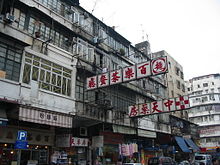
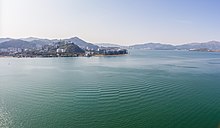

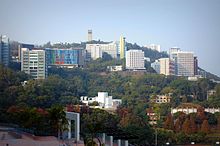
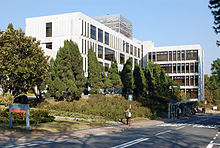
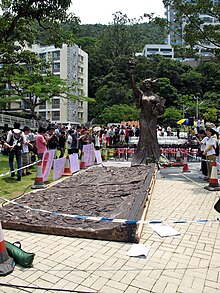

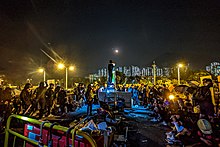



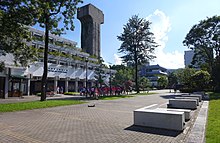
 United College (above) and Chung Chi Tong student centre (below).
United College (above) and Chung Chi Tong student centre (below).
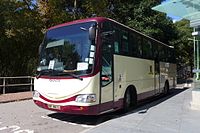
City University of Hong KongClassical ChinesePublicChairmanChancellorJohn Lee Ka-chiuVice-ChancellorDennis LoProvostAlan K. L. ChanNick RawlinsUndergraduatesPostgraduatesShatin, New TerritorieshectaresColoursASAIHLChinese phoenixTraditional ChineseSimplified ChineseCantoneseStandard MandarinHanyu PinyinYue: CantoneseYale RomanizationJyutpingresearch universitySha TinNew TerritoriesHong KongcollegesChung Chi CollegeNew Asia CollegeUnited CollegeUniversity of Hong KongSt. John's UniversityLingnan UniversityYenching Universitynine constituent collegesfacultiescollegiate universityNobel PrizeTuring AwardFields MedalVeblen PrizeConfucianmainland ChinaChinese Communist RevolutionCh'ien MuTang JunyiKowloonKau Pui LungFord FoundationSham Shui PoCommunist revolution in ChinaPeople's Republic of ChinaUnited StatesKorean WarProtestantHong Kong IslandMa Liu ShuiGuangdongCaine RoadTolo Harbourmedium of instructionJohn FultonUniversity of SussexLegislative CouncilCity HallRobert Brown BlackLi Choh-mingW. Szeto and PartnersplateauxPlover Cove damPrince of Wales HospitalSha Tin New TownMichael HerriesC.K. YangCh'ien Mu LibraryShaw CollegeRun Run ShawDavid WilsonHong Kong Internet Exchangenetwork backbone334 SchemeMorningside CollegeS. H. Ho CollegeWu Yee Sun CollegeLee Woo Sing CollegeJoseph SungThe StandardChinese University of Hong Kong conflict2019–20 Hong Kong protestspolicetear gasbean bag roundsrubber bulletspetrol bombsRocky TuanMarine PolicehandoverMa LinSir Charles KaoArthur LiAmbrose KingLawrence LauMedicineEnglishYale-China Chinese Language CentreYale-China AssociationPutonghuaminority languagesVirginia YipStephen MatthewsJu MingElisabeth Luce Moore LibraryCh’ien Mu LibraryWu Chung LibraryChinese University of Hong Kong Art MuseumMuseum of Climate ChangeHong Kong Jockey ClubUniversity rankingsUS News & ReportGreater Chinalist of subject rankings of Hong Kong tertiary institutionsMinistry of Education (MoE)
